Police Academy Blu-ray Movie
HomePolice Academy Blu-ray Movie 
Shout Factory | 1984 | 96 min | Rated R | Nov 21, 2023 in The Police Academy Collection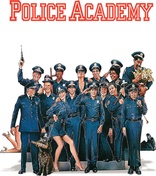
Price
Movie rating
6.8 | / 10 |
Blu-ray rating
| Users | 4.0 | |
| Reviewer | 4.0 | |
| Overall | 4.0 |
Overview
Police Academy (1984)
A group of good-hearted but incompetent misfits enter the police academy, but the instructors there are not going to put up with their pranks.
Starring: Steve Guttenberg, Kim Cattrall, G.W. Bailey, Bubba Smith, Donovan ScottDirector: Hugh Wilson (I)
| Comedy | Uncertain |
| Crime | Uncertain |
Specifications
Video
Video codec: MPEG-4 AVC
Video resolution: 1080p
Aspect ratio: 1.85:1
Original aspect ratio: 1.85:1
Audio
English: DTS-HD Master Audio 2.0 Mono (48kHz, 24-bit)
Subtitles
English SDH
Discs
Blu-ray Disc
Single disc (1 BD)
Playback
Region A (B, C untested)
Review
Rating summary
| Movie | 4.0 | |
| Video | 4.0 | |
| Audio | 4.0 | |
| Extras | 5.0 | |
| Overall | 4.0 |
Police Academy Blu-ray Movie Review
Reviewed by Brian Orndorf December 8, 20231984’s “Police Academy” is not a film that was pulled out of thin air. The monster successes of 1978’s “Animal House” and 1981’s “Stripes” certainly inspired the feature, with co-writer/director Hugh Wilson in charge of creating a wily, wacky, crude “institutional” comedy for the masses, pitting social rejects and mild people against an establishment trying to mold them into authority figures. The formula is there, and Wilson isn’t challenging it, but he does manage to make a refreshingly light endeavor that’s purely out to charm viewers with an enormous amount of screen shenanigans. The first bite of the “Police Academy” apple is appealing and amusing, launching with a freewheeling attitude and surprisingly excellent casting, with the ensemble contributing quirks and craziness to give the picture a wonderful sense of community.
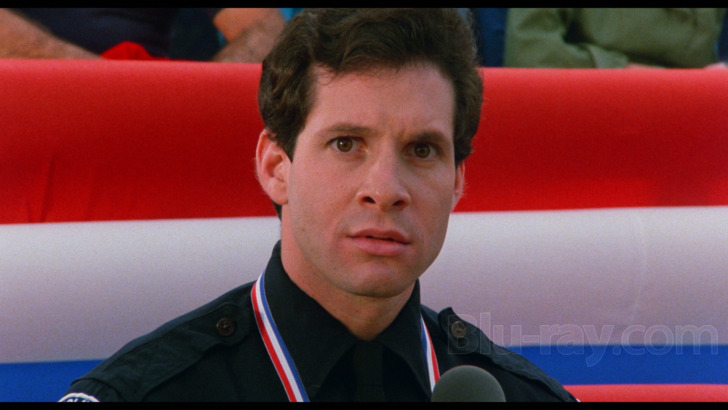
New rules set by the governor now allow anyone to join the Police Academy to help with staffing shortages, giving the public a chance to prove themselves during the 14-week-long program. For Mahoney (Steve Guttenberg), time at training is punishment, with the habitual rascal forced to go through with the process to stay out of trouble, inspiring him to sabotage his stay. He’s joined by florist Hightower (Bubba Smith), gun nut Tackleberry (David Graf), soft-spoken Hooks (Marion Ramsey), privileged Karen (Kim Cattrall), wacko Jones (Michael Winslow), pushover Barbara (Donovan Scott), ladies’ man Martin (Andrew Rubin), clumsy Fackler (Bruce Mahler), and toadies Copeland (Scott Thomson) and Blankes (Brant von Hoffman), commencing a tough training process overseen by Lt. Harris (G.W. Bailey), Sgt. Callahan (Leslie Easterbrook), and Commandant Lassard (George Gaynes). Mahoney doesn’t want to be there, but his time at the Police Academy proves to be an educational experience, dealing with strange people unprepared for the real mayhem of the big city.
Characterization doesn’t cut very deep in “Police Academy,” but Wilson gets the picture up and running quickly, primarily focusing on the impish ways of Mahoney, a man without a plan who can’t deal with authority or rudeness. There’s some understanding of criminal history for Mahoney, but the writing generally treats him like a lovable goof, forced to participate in the program, which allows him to hit on Karen, befriend Jones, and make life miserable for Lt. Harris, an old-school taskmaster who lives to make the cadets miserable, merely waiting for his chance to take control from Lassard. “Police Academy” assigns bits to every character, as Hooks is unable to be assertive and Martin can’t stay out of the female dormitory, but it finds a central story in Mahoney’s quest to get kicked out of the program, pushing all of Lt. Harris’s buttons in the process.
Pranks are common in “Police Academy,” watching Mahoney engineer mischief to rattle the staff and speed up his dismissal. Not everything works, but the production has something with half-wits Copeland and Blankes, who are working to cozy up to Lt. Harris, only to be sunk by their stupidity. The moronic sycophants are almost the co-leads of the picture, as Wilson favors their overly confident ways, but there’s a decent balance to the ensemble, and everyone gets their time to shine (with the exception of Cattrall, who really has nothing to do here). The fun of “Police Academy” is watching these oddballs go through the system, bungling training opportunities and tests, dealing with the pressures of the program in their own unique ways. Laughs emerge from such silliness, especially good-natured slapstick and shenanigans, exploring the development of friendships. However, not everything lands, with Wilson committed to some highly bizarre ideas (including an oral sex joke involving a massive lectern that Gaynes plays superbly) and broad events (Lt. Harris has a head-on moment with a horse’s rear-end) that feel out of place, trying a little too hard to bring outrageousness to a movie that does perfectly fine with dumb guy humor and behavioral issues.
Police Academy Blu-ray Movie, Video Quality 
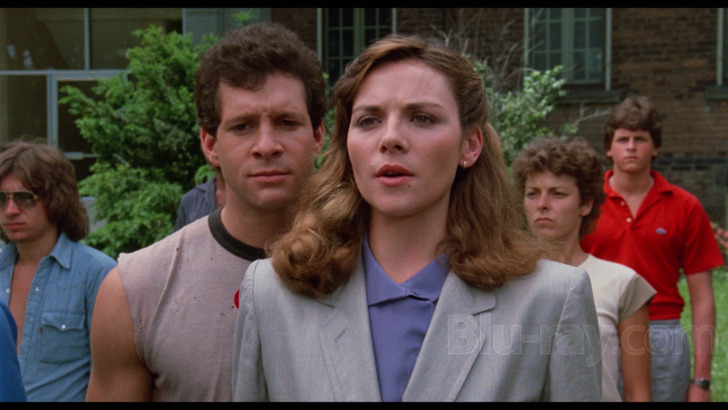
The AVC encoded image (1.85:1 aspect ratio) presentation is sourced from a 2K scan of the interpositive. Viewers unhappy with previous home video releases of "Police Academy" should be somewhat happy with the upgrade here, which secures a decent amount of screen detail, exploring skin surfaces and police cadet clothing, which ranges from softer sweats to crisper uniforms. Interiors preserve depth and decoration. Exteriors are dimensional, exploring city streets in the climatic riot. Colors are stable, with defined greenery and strong primaries on costume choices, also doing well with crisp blacks. Skin tones are natural. Delineation is satisfactory. Grain is adequately resolved. Source is in good condition.
Police Academy Blu-ray Movie, Audio Quality 
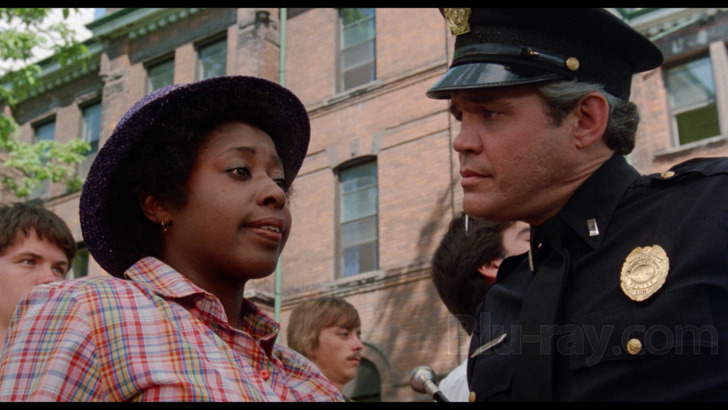
The 2.0 DTS-HD MA mix presents crisp dialogue exchanges, handling varied performance choices and levels of comedic intensity without distortion. Scoring is bright, with a clear presence and defined instrumentation, leading with the brassy ways of the "Police Academy" march. Sound effects are appreciable, with snappier gun fire and moments of citywide destruction.
Police Academy Blu-ray Movie, Special Features and Extras 
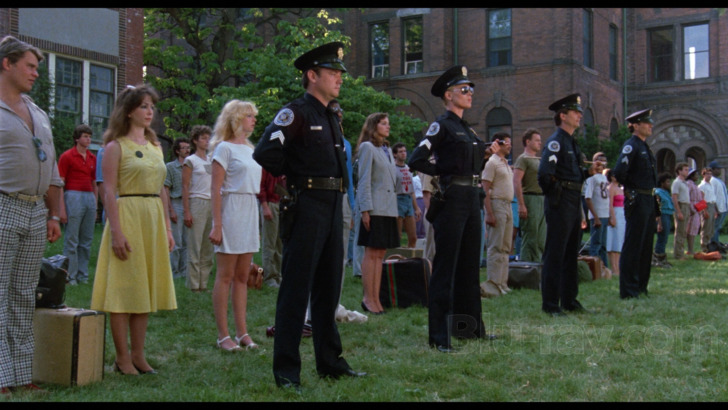
- Commentary features director Hugh Wilson, producer Paul Maslansky, and actors Steve Guttenberg, Michael Winslow, Leslie Easterbrook, and G.W. Bailey.
- "What They Don't Know Can't Hurt Them" (19:56, HD) is an interview with producer Paul Maslansky about his time on "Police Academy." Maslansky was originally hired by The Ladd Company to work on "The Right Stuff," which put him in contact with San Francisco police academy cadets for crowd control purposes. A story was born and development commenced, soon attracting attention from co-writer/director Hugh Wilson. Casting is celebrated, with the interviewee offering special attention to Michael Winslow, who was a struggling stand-up comedian at the time. Shooting locations are detailed, with the franchise eventually traveling all over the world. Test screening memories are shared, with the first picture requiring a different ending to send viewers out on a high.
- "Desperate Measures Were Taken" (11:49, HD) is an interview with co-writers Neal Israel and Pat Proft (who appears audio only), who were tasked with coming up with the script after charming producer Paul Maslansky. The men actually visited various law enforcement academies, studying the students, collecting their personalities for characterizations, finding gold with these odd people. Only Mahoney is an invention, with Israel and Proft putting themselves into the character. Some talk of structure is shared, and comedy trends of the day are recalled, with the pair going raunchy to keep up with marketplace demands. Early reaction to "Police Academy" is revealed, with the writers quickly turning down a chance to create a sequel.
- "Move It! Move It!: Recruiting Captain Harris" (16:03, HD) is an interview with actor G.W. Bailey, who wasn't delighted with the "Police Academy" script, but happy to take a major role in a movie, only to learn he was on standby while Paul Dooley considered an offer to play Lt. Harris. Bailey identifies possession of his swagger stick as the birth of the character, keeping it throughout his time on the series. The interviewee recalls his struggle saying rough lines to Bubba Smith, who became a dear friend, and he details relationships with other co-stars, including time spent with Lance Kinsey. Memories of director Hugh Wilson are shared, who was a no-nonsense helmer, shooing away the actor's concerns about the part. Bailey wanted to continue on with Wilson for "Burglar," requiring help from producer Paul Maslansky to rejoin the "Police Academy" series for the third sequel.
- "Send in the Recruits" (15:53, HD) is an interview with composer Robert Folk, who shares his hiring story, with his name making its way to producer Paul Maslansky, who required the creation of a memorable march. Folk analyzes the manufacturing of themes and tone for the endeavor, looking to generate fun for the physical comedy of the feature. Folk was brought right back for "Police Academy 2: Their First Assignment," looking to generate a more urban sound for the sequel. Technical choices are highlighted for "Police Academy 4: Citizens on Patrol," and atmosphere is identified for "Police Academy 5: Assignment Miami Beach."
- "Behind Academy Doors: Secret Files Revealed" (30:23, SD) is a 2004 making-of for "Police Academy," featuring interviews with producer Paul Maslansky, director Hugh Wilson, stunt actors Wink Roberts and Alan Oliney, and actors Steve Guttenberg, Bubba Smith, G.W. Bailey, Michael Winslow, Leslie Easterbrook, George Gaynes, Donovan Scott, Marion Ramsey, David Graf, Brant Van Hoffman, and Scott Thomson. Maslansky and Wilson detail the origin story of the screenplay, using real exposure to police cadets to fuel a comedy about their antics. The cast is celebrated, with Maslansky marveling over the ensemble, who all brought something special to the project. Casting stories and characterization is extensively explored, with the interviewees analyzing their parts in the "Police Academy" puzzle, also showing off their lasting camaraderie as they "visit" one another's interview time. Some on-set stories are recalled, and stunt action in analyzed, with some dangerous situations involved in the making of the comedy. Tales from pop culture longevity and screening glory close out the featurette.
- And a Theatrical Trailer (2:14, SD) is included.
Police Academy Blu-ray Movie, Overall Score and Recommendation 
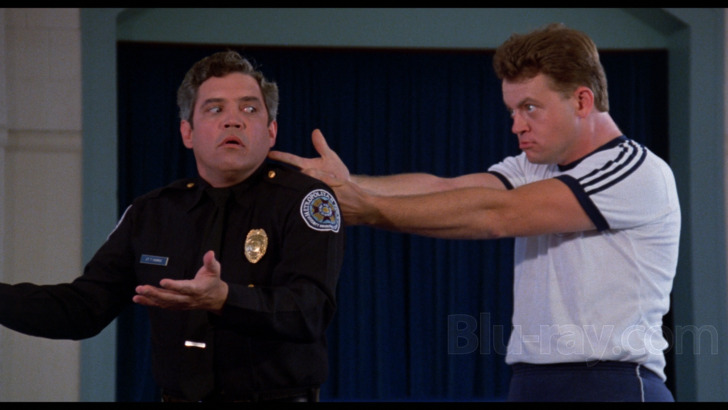
"Police Academy" skims a lot of subplots to bring everything to a boil in the final act, where the cadets have to deal with a city-wide riot in their own special ways. It's an active finale for a snappily paced film, with Wilson doing an excellent job leaving viewers on a high of mischief and panic, knowing to get out as soon as possible. Certain things have not aged well in the R-rated picture, but "Police Academy" is mostly harmless and happy to make a mess of things, using the gifts of the ensemble to generate an enticing playfulness as all these crazy people gather to become officers of the law, only to form a ragtag unit of unlikely heroism instead.
Similar titles
Similar titles you might also like

Police Academy 6: City Under Siege
1989

Police Academy 3: Back in Training
1986

Police Academy 4: Citizens on Patrol
1987

Police Academy 5: Assignment Miami Beach
1988

Police Academy 2: Their First Assignment
1985

Police Academy: Mission to Moscow
1994

Playing with Fire
2019

Spies Like Us
1985

Naked Gun 33⅓: The Final Insult
1994

The Naked Gun 2˝: The Smell of Fear
1991

Gone Fishin'
1997

Here Comes the Boom
2012

Weekend at Bernie's
1989

Who's Harry Crumb?
Retro VHS Collection
1989

Men at Work
MVD Rewind Collection
1990

Balls of Fury
2007

Tommy Boy 4K
1995

The Money Pit
1986

Black Sheep 4K
1996

Madea's Witness Protection
2012